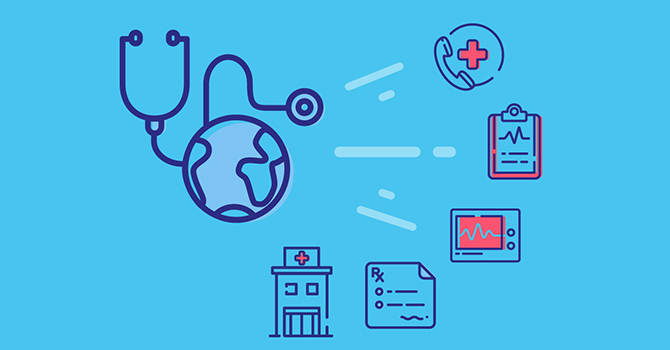Understanding the Duty of Healthcare RCM in Enhancing Monetary Performance and Client Fulfillment
Navigating the ins and outs of Medical care Earnings Cycle Monitoring (RCM) is essential for accomplishing optimum monetary performance while at the same time boosting patient complete satisfaction. RCM's ability to enhance payment, make sure accurate coding, and speed up claims processing stands as a cornerstone of contemporary health care operations. Nevertheless, the nuanced interaction between these elements warrants a more detailed examination to totally appreciate their effect on both doctor and individuals. As we check out the transformative potential of RCM, inquiries regarding its strategic implementation and future advancements beckon, encouraging insights that can redefine sector requirements and client experiences alike.

Key Elements of RCM
In the complex landscape of health care, Revenue Cycle Monitoring (RCM) is critical in guaranteeing financial security and operational efficiency. Individual enrollment and qualification verification are fundamental actions, making sure that precise patient information is recorded and insurance coverage is confirmed prior to solutions are rendered.

Charge capture is an additional essential component, entailing the precise recording of services given to individuals. It guarantees that all billable solutions are made up, therefore optimizing income possibility. Simultaneously, medical coding translates patient experiences right into standardized codes, which are important for invoicing and regulative compliance.
Cases entry and management comply with, entailing the prep work and submission of cases to payers. This procedure needs careful focus to information to decrease errors and protect against hold-ups. Denial management is a positive strategy to deal with and address rejected insurance claims, securing revenue streams.
Finally, payment publishing and person collections finish the cycle, making certain repayments are accurately recorded and superior balances are gone after. With each other, these parts develop a robust framework that supports the functional and monetary health and wellness of healthcare companies.
Effect On Financial Efficiency
Effective Earnings Cycle Administration (RCM) significantly affects a medical care company's economic efficiency by optimizing capital and reducing income leakage. RCM encompasses the thorough billing and collection procedures that guarantee healthcare companies effectively manage their financial transactions from person enrollment to final payment. By simplifying these processes, organizations can reduce denied insurance claims, speed up payment cycles, and improve total financial wellness.
Monetary efficiency is enhanced via meticulous management of payment procedures, which involves exact coding and timely submission of insurance claims. This minimizes the possibility of claim denials and denials, which can significantly prevent profits flow if not attended to promptly. Moreover, incorporating innovative modern technology remedies assists in real-time monitoring of claims and financial metrics, giving health care administrators with the devices necessary to make informed strategic decisions.

Enhancing Client Satisfaction
While enhancing economic performance is an essential goal of Profits Cycle Administration (RCM), it likewise plays a pivotal duty in enhancing patient fulfillment. By lowering management problems, RCM permits medical care suppliers to focus more on client care, which directly improves patient satisfaction.

RCM additionally improves patient satisfaction with effective interaction. By preserving a thorough data source of patient info, RCM helps with improved interaction between patients and health care companies, making certain individuals feel educated and valued.
Techniques for Effective RCM
Accomplishing reliable Income Cycle Monitoring (RCM) calls for health care organizations to carry out a set of calculated methods that make sure monetary stability and operational performance. One crucial strategy is the fostering of technology-driven remedies, such as integrated software program systems that simplify payment processes, minimize mistakes, and improve data accuracy. These systems enable real-time tracking of economic metrics, enabling for timely recognition and correction of inefficiencies.
An additional approach is the standardization of procedures across the income cycle. Healthcare RCM. This involves establishing consistent plans for client registration, insurance policy verification, and asserts processing. By making certain that all personnel follow these criteria, companies can quicken and minimize disparities payment collections
Personnel training and growth additionally play an essential function in effective RCM. Well-trained employees can successfully browse complicated billing procedures and guidelines, decreasing rejections and boosting cash circulation. Routine updates on policy modifications and best practices aid preserve a well-informed and experienced labor force.
Future Trends in RCM
As health care organizations improve their Earnings Cycle Administration (RCM) methods with technology and standard procedures, interest is now transforming towards the future patterns shaping this important area. One substantial trend is the combination of fabricated intelligence (AI) and artificial intelligence to automate intricate jobs, such as claims refining and predictive analytics. These technologies are expected to lower errors, increase transaction pop over to this web-site times, and offer data-driven insights for better decision-making.
In addition, the change in the direction of value-based treatment proceeds to affect RCM techniques - Healthcare RCM. Medical care providers are anticipated to progressively concentrate on client end results and satisfaction, requiring RCM systems that can suit new reimbursement designs. This shift will need more detailed information collection and analysis to successfully gauge and report on efficiency metrics
Interoperability is one more arising top priority, as smooth information exchange between inconsonant systems comes to be critical. Boosted interoperability will certainly facilitate even more accurate individual information sharing, decreasing administrative concerns and enhancing the person experience.
Final Thought
Health Care Profits Cycle Monitoring (RCM) considerably affects both financial efficiency and individual complete satisfaction by optimizing payment procedures, making sure precise coding, and enabling punctual cases submission. Reliable RCM minimizes income leakage and increases capital, lowering insurance claim rejections and speeding up repayments. This efficiency cultivates trust and satisfaction amongst people. RCM systems additionally help with far better interaction and flexible repayment choices, creating a patient-centered view experience. Future RCM patterns will likely concentrate on more integrating technology to boost these benefits.
Browsing the intricacies of Medical care Revenue Cycle Monitoring (RCM) is vital for accomplishing ideal monetary performance while concurrently boosting person fulfillment. RCM incorporates the detailed payment and collection processes that make sure health care carriers effectively handle their financial deals from client registration to final settlement. By reducing administrative concerns, RCM permits health care carriers to concentrate much more on patient treatment, which directly boosts individual contentment.
By maintaining a thorough data source of person information, RCM assists in enhanced communication in between patients and healthcare service providers, guaranteeing people feel educated and valued.Healthcare Earnings Cycle Monitoring (RCM) significantly affects both economic efficiency and individual satisfaction by enhancing invoicing procedures, ensuring accurate coding, and allowing timely insurance claims entry.